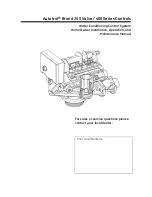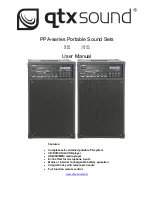
XVME-200/290 Manual
December, 1987
In these modes, the direction of two of the handshake pins (H2 and H4) should be
programmable.
However, due to constraints in hardware design, pin H4 must always
be programmed as an output.
Thus, pin H2 may be programmed as either an input
or an output depending on what type of handshake protocol is to be used. Jumpers
Jl and J3 (refer to Figure 2-1 (XVME-200) or Figure 2-2 (XVME-290) for the
location of these jumpers) are used in conjunction with the programmed direction of
pin H2 to determine whether the buffered handshake line H2 will be used as an
input or an output.
Jumper Jl is used to control the direction of the PI/T #l - H2
line and Jumper J3 is used to control the direction of the PI/T #2 - H2 line.
NOTE
In order to prevent the possibility of signal contention
when using handshake protocol, pin H4 of a 68230 chip
must always be programmed as an output with the H4
interrupt disabled, and the programmed direction of pin
H2 must be consistent with the position of the
corresponding jumper (J1 or J3).
Table 2-5 shows the relationship between the position of jumpers Jl and J 3 and the
direction of the buffered handshake line H2 for each of the PI/T chips.
Table 2-5. Handshake Line H2 Direction Jumpers
.
PI/T #I PI/T #2
Jumper JI Jumper J3
Direction of the corresponding
H2 handshake lines.
In
Out
In
Out
Input
Output
CAUTION
The module is factory-shipped with Jl and J3 installed.
Therefore, it will be necessary to remove the jumpers if
the PI/T H2 lines are to be programmed as outputs.
Failure to do so will result in signal contention.
2.5 CONNECTOR PIN ASSIGNMENTS
2.5.1
JKl and JK2 Connectors
The PI/T port data lines, port handshake lines, and timer I/O lines are all available
to the user at two 50-pin connectors located on the module front panel (refer to
Figure 2-1 (XVME-200) or Figure 2-2 (XVME-290)). The connectors are labeled JKl
and JK2.
The two connectors have identical pinouts and differ only as to which
PI/T device they interface with. Connector JKl carries the signals pertaining to
PI/T #l and Connector JK2 carries the signals pertaining to PI/T #2.
2-9
Summary of Contents for XVME 200
Page 1: ......
Page 2: ......
Page 3: ......
Page 4: ......
Page 7: ......
Page 8: ......
Page 14: ......
Page 15: ......
Page 16: ......
Page 23: ......
Page 31: ......
Page 49: ......
Page 50: ......
Page 51: ......
Page 52: ......
Page 53: ......
Page 54: ......
Page 55: ......
Page 56: ......
Page 57: ......
















































